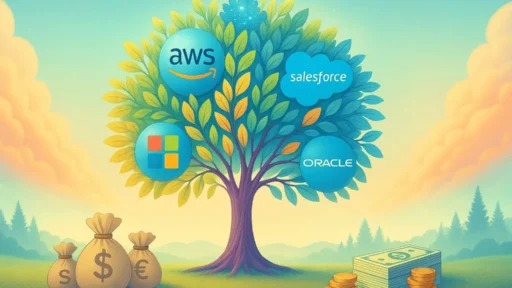Last Updated: January 23, 2026
ChatGPT Enterprise has been out for almost 8 months, and according to OpenAI, growth has been off the charts. We just learned that paying enterprise users has grown from 150,000 to 600,000 since the start of the year.
But what types of companies are actually paying for it? To find out, I decided to use real-time B2B purchase and churn data from Bloomberry to find every organization, big or small that is currently paying for a ChatGPT Enterprise or Teams license.
Are there any trends or patterns in the sectors, countries, and size of their customers? Here’s what I learned…
1. ChatGPT Enterprise is used by only ~5% of the Fortune 500
Despite the media hype, only ~5% of the Fortune 500 is using ChatGPT Enterprise/Teams. Companies like Adobe, JetBlue, PwC, Hubspot, and Uber were just some of the biggest ChatGPT enterprise customers I found.
If you’re looking at this with the glass half-full, there’s still a very long runway left for OpenAI. For comparison, Salesforce has >= 80% penetration among the Fortune 500, and Atlassian has >= 66% penetration. ChatGPT arguably has more use cases than both of those tools. So we are still in the very early innings of ChatGPT usage in the workplace.
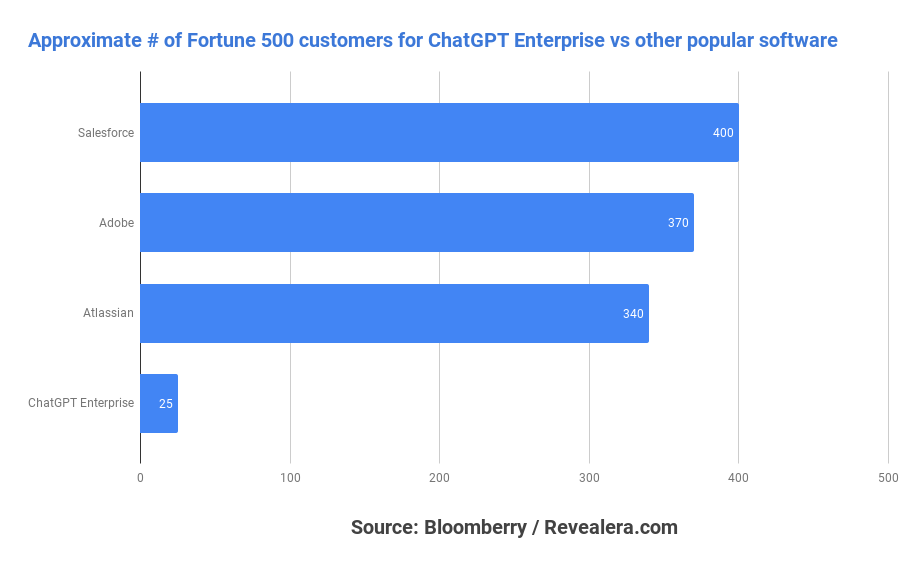
2. A lot of companies still have trust issues around ChatGPT
At the same time, there’s still some skepticism over whether ChatGPT is safe to use.
Of all the major companies that put restrictions on ChatGPT last year, none of them have changed their mind, including JP Morgan Chase, Apple, Amazon, and Spotify. Despite enterprise-grade security, and promises to never train on customer’s data, a lot of of companies are cautious and taking a wait-and-see approach before signing up for ChatGPT Enterprise.
Furthermore, I couldn’t detect a single ChatGPT Enterprise customer among the 10 biggest technology companies. Apple, Amazon, Meta, Microsoft, Google, Salesforce, Nvidia, AMD, Broadcom and Oracle were nowhere to be found in the list of paying customers. Some of them have their own competitor products like Microsoft with Microsoft Copilot, and Google with Gemini, so naturally they’d want their employees to use their tools instead.
3. Tech and financial companies are more likely to be paying customers
Unsurprisingly, tech companies lead the way with a 8.2% adoption rate. Financial services was 2nd with a 6.6% adoption rate, but the majority of these customers were “modern” fintech companies like Robinhood, Klarna, and Chime rather than traditional banks like JP Morgan Chase, or Citigroup.
The sectors with the lowest adoption rates aren’t too surprising: Industrials, and Utilities & Energy. These companies aren’t focused as much on large-scale data processing/analysis, or customer service, so it makes sense that these companies don’t have a compelling use for ChatGPT yet.
Not listed here are government agencies. We only detected a few government entities as paying customers, most noticeably the State of Pennsylvania. Of course, there’s a lot of regulatory and compliance issues that need to be dealt with before government organizations will feel confident using AI tools, so I imagine it will be a very very long time before the IRS decides to use ChatGPT to automate auditing tax returns (if ever)
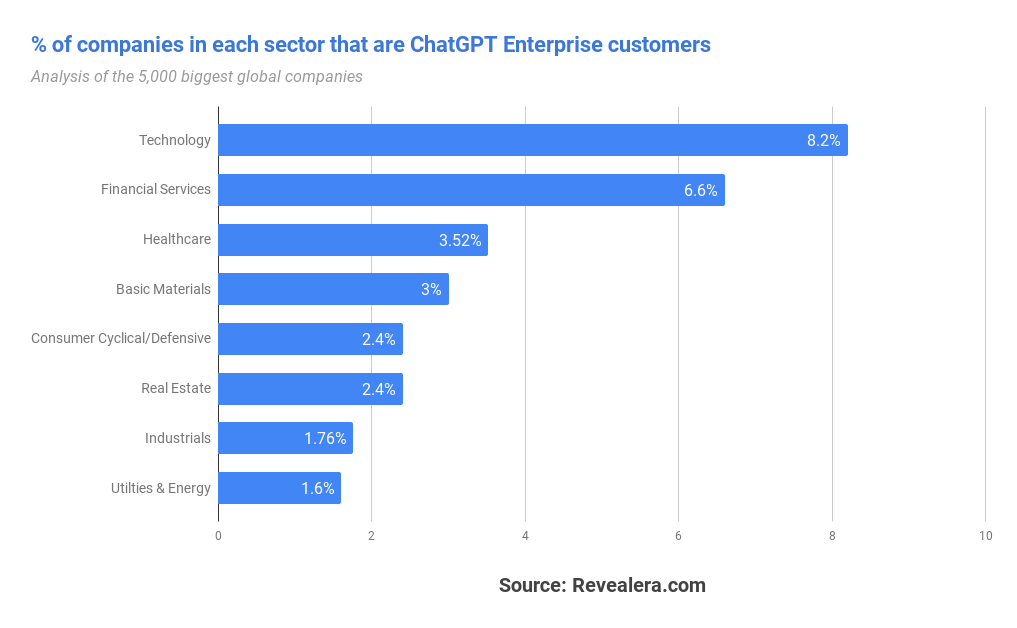
4. Startups are 2x more likely to be ChatGPT Enterprise customers than public companies
Among all unicorns with >$1 billion valuation, 6% of them were ChatGPT Enterprise customers. Among all public companies > $1 billion market cap, only 3% of them were ChatGPT Enterprise customers. Not a surprise here, given that startups, by nature move faster than big, monolithic enterprises.
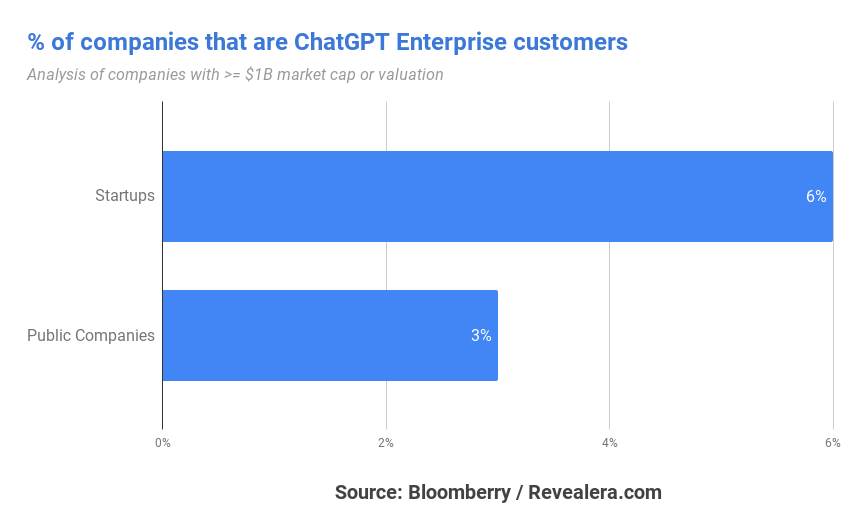
5. US-based companies lead the way in adoption, with the EU and Canada lagging behind
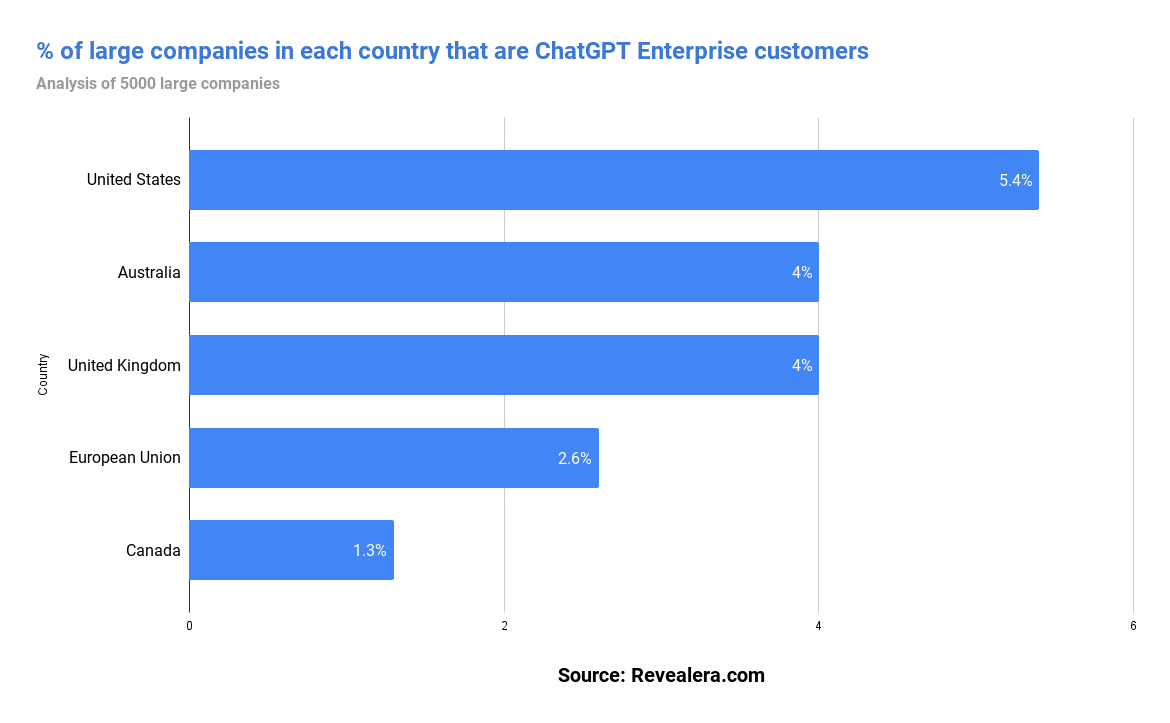
When it comes to which countries are adopting ChatGPT Enterprise, US-based companies lead the way, with 5.4% of the largest US companies.
Among all large EU-based companies we analyzed, only 2.6% of them were ChatGPT Enterprise customers. The EU has stringent data privacy and protection laws like GDPR, and these regulations could make EU companies more cautious about adopting AI technologies like ChatGPT.
Among the countries we tracked, the country with the lowest rate of ChatGPT Enterprise adoption was Canada, which the Prime Minister of Canada probably wants to change with his $2 billion investment in AI.
6. There’s no link between companies that use ChatGPT Enterprise and their hiring
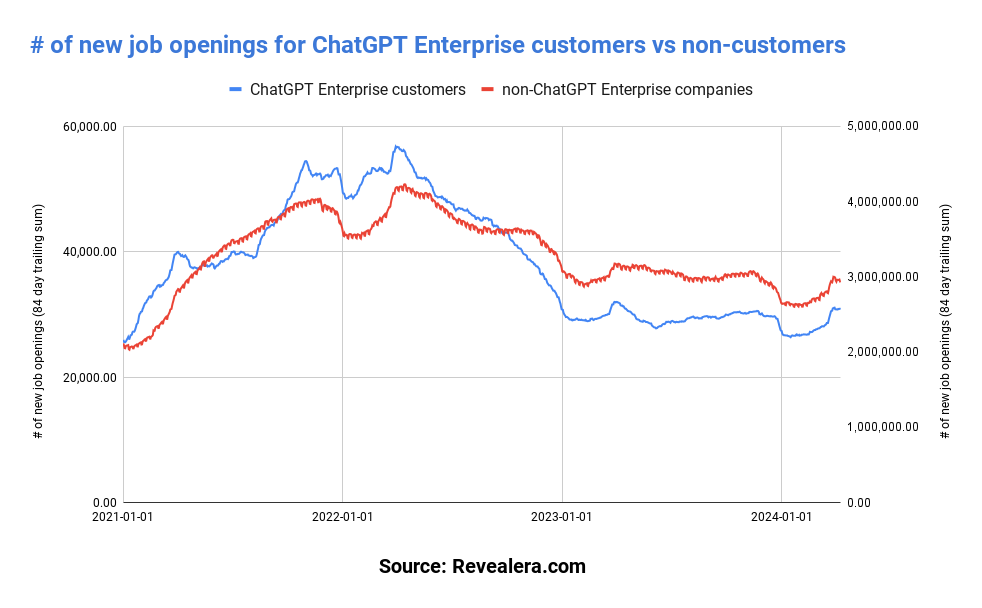
Is there a relationship between companies that use ChatGPT Enterprise and their hiring rates? Are ChatGPT Enterprise users more likely to be cutting jobs? So far the data says no. If anything it’s the opposite. Companies that use ChatGPT Enterprise had pretty much the same # of job openings in Q1 compared to Q1 of last year. However, companies that didn’t use ChatGPT Enterprise had 7% less new job openings in Q1 of 2024 compared to Q1 of last year.
Conclusion: It’s far too early to analyze whether these AI tools will increase productivity so much that less workers will be needed, but so far the data says there’s no need to worry yet.
7. Companies that use ChatGPT Enterprise are not hiring AI talent as fast as companies that don’t use ChatGPT Enterprise
Interesting, companies that use ChatGPT Enterprise are not hiring AI talent as fast as companies that aren’t using it.

In the first 3 months of this year, ChatGPT Enterprise companies had a 27% increase in the # of new job openings that mention “AI”. In comparison, companies that aren’t ChatGPT Enterprise customers had a whopping 120% increase in the # of new job openings that mention ‘AI’.
It could be that non-customers are developing in-house AI tools and LLMs instead of opting to use ChatGPT Enterprise. Building their own tools allows them to tailor it to their own unique needs. It also helps them maintain more control over their data and IP. And in order to build their own internal AI tools, they need to hire a lot more AI talent.
8. Three of the Big 4 accounting firms use ChatGPT Enterprise
PwC, KPMG and Ernst & Young all are ChatGPT Enterprise users, which shows that even large, slow organizations aren’t afraid of adopting it. From auditing to tax compliance and conducting market research, there’s a plethora of use cases that fit into the workflow of these companies.
Summary
- ChatGPT Enterprise is only used by 5% of the Fortune 500, and we’re still in the very early innings
- Most if not all companies that have restricted use of ChatGPT in the workplace have not changed their minds
- Tech and financial companies lead the way in usage, with Industrials, Utilities, Energy and Government entities lagging behind
- US-based companies lead the way in usage, with EU and Canada lagging behind
- Companies that use ChatGPT Enterprise are not hiring less than companies that don’t use ChatGPT Enterprise
- Companies that use ChatGPT Enterprise are not hiring AI talent as faster as companies that don’t use ChatGPT Enterprise
📊 See which companies use these tools
Explore adoption data for the enterprise AI and productivity tools transforming the workplace:


